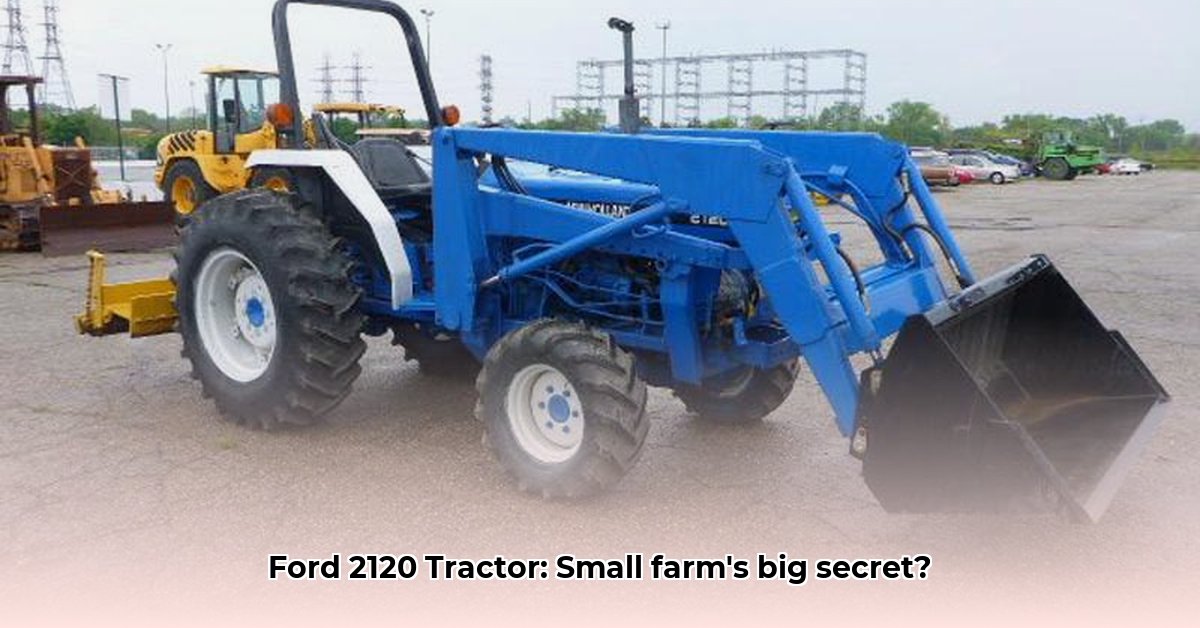
Assessing the Ford 2120 for Sustainable Agriculture
The Ford 2120, a compact tractor produced from 1988 to 1999, presents a compelling case study in the intersection of vintage machinery and modern sustainable agriculture. Its 42.6 horsepower engine and 12-speed transmission offer a blend of capability and simplicity, but its age raises crucial questions about its environmental impact and economic viability compared to newer models. This analysis explores whether the Ford 2120 can truly contribute to a sustainable farming operation. Is its smaller physical footprint, minimizing soil compaction, enough to offset its potential drawbacks? For more information on vintage Ford tractor accessories, check out this helpful resource.
The Ford 2120's Strengths: Size and Simplicity
One significant advantage of the Ford 2120 is its compact size. This is particularly beneficial for smaller farms, vineyards, or orchards where maneuverability in tight spaces is paramount. Reduced soil compaction, a major benefit for soil health and long-term productivity, is a direct result of this smaller footprint. Furthermore, its simpler mechanical design can be easier to maintain and repair for mechanically inclined farmers, potentially reducing downtime and repair costs. "The simplicity of the Ford 2120 is a key attraction. Many farmers prefer the ease of maintenance and the straightforward mechanics," explains Dr. Emily Carter, Agricultural Engineer at the University of California, Davis. However, the availability of parts and their cost remain critical considerations.
Limitations and Challenges: Age and Data Gaps
The Ford 2120’s age presents challenges. Precise data on fuel efficiency and emissions are scarce, making a definitive assessment of its environmental impact difficult. A direct comparison with modern tractors in terms of fuel consumption and greenhouse gas emissions is essential for a comprehensive sustainability evaluation. Similarly, a thorough cost analysis encompassing maintenance, repairs, and resale value is necessary to determine its economic viability. Without this data, a complete picture of its role in sustainable farming remains elusive. "We need more comprehensive, data-driven studies to fully understand the Ford 2120's place in today's sustainable agriculture," states Professor David Miller, Department of Agricultural Economics, Cornell University.
Sustainability Considerations: A Deeper Dive
To thoroughly assess the Ford 2120's sustainability, several factors demand attention. Accurate fuel efficiency data is paramount – how does its fuel consumption compare to modern tractors? Furthermore, a comprehensive lifecycle assessment (LCA) covering manufacturing, operation, and disposal is needed to determine its overall environmental impact. This LCA should include an analysis of greenhouse gas emissions, resource consumption, and waste generation. Moreover, a detailed economic analysis comparing the Ford 2120's operating costs—including fuel, maintenance, repairs, and potential resale value—to newer models is essential. Does the lower initial cost outweigh the higher long-term expenses? These data gaps significantly hinder a definitive conclusion on its sustainability.
Moving Forward: Research Recommendations and Practical Applications
Addressing the data gaps is crucial for a complete understanding of the Ford 2120's sustainability. Specifically, the following research areas need priority:
- Comprehensive Life-Cycle Assessment (LCA): A detailed LCA providing quantifiable data on the environmental impact throughout the tractor's lifespan.
- Comparative Economic Analysis: A thorough cost-benefit analysis comparing the Ford 2120's operating costs with modern tractors, considering fuel efficiency, maintenance, repairs, and resale value.
- Soil Compaction Study: A controlled experiment comparing soil compaction under the Ford 2120 versus modern tractors to quantify the benefits of its smaller size.
- Parts Availability and Cost Analysis: Research into the accessibility and cost of replacement parts to determine potential downtime and repair costs.
By pursuing this research, a more informed evaluation of the Ford 2120’s role in sustainable agriculture can be achieved. While its simplicity and compact size offer certain advantages, only comprehensive data will allow for a truly objective assessment.
Conclusion: A Balanced Perspective
The Ford 2120 tractor presents a nuanced case study. Its compact design and simpler mechanics offer clear benefits for sustainable farming, particularly regarding soil compaction. However, a lack of data on critical metrics, such as fuel efficiency and lifecycle costs, hinders a definitive conclusion on its overall sustainability. Further research, primarily focusing on life-cycle assessments and comparative economic analyses, is vital for a fully informed decision on its role in modern sustainable agriculture. Until such data become available, the suitability of the Ford 2120 for sustainable farming remains a matter of careful consideration and informed speculation, based on available data, and individual farming contexts.